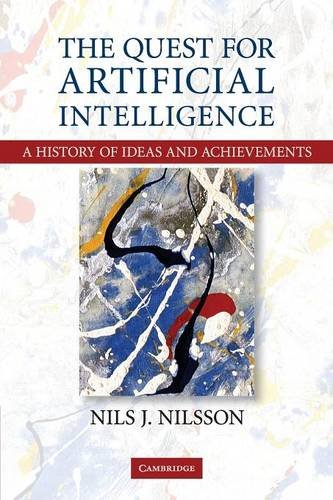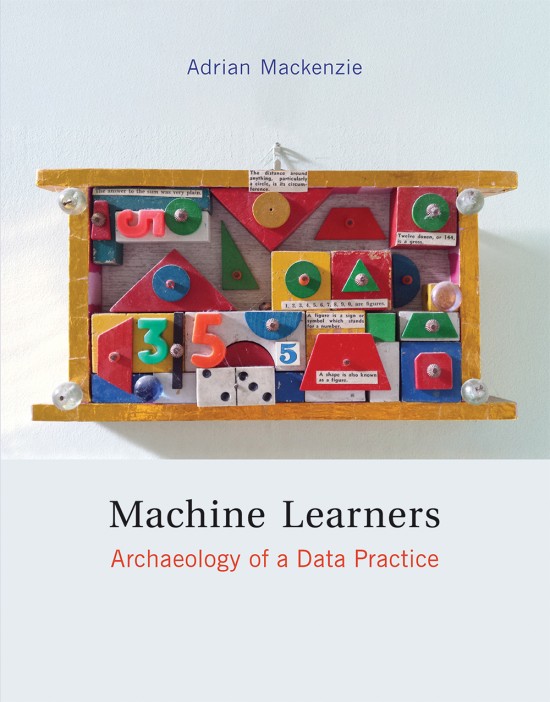Nils J. Nilsson: The Quest for Artificial Intelligence: A History of Ideas and Achievements (2009)
Filed under book | Tags: · artificial intelligence, computation, computing, history of science, machine learning, neural networks, robotics

“This book traces the history of artificial intelligence, from the early dreams of eighteenth-century (and earlier) pioneers to the more successful work of today’s AI engineers. The book includes many diagrams and easy-to-understand descriptions of AI programs that will help the casual reader gain an understanding of how these and other AI systems actually work.”
Self-published 2009 (web version)
Publisher Cambridge University Press, 2009 (print version)
Open access (web version)
ISBN 9780521116398, 0521116392 (print version)
707 pages
Review: Peter Norvig (Artificial Intelligence, 2010).
PDF (15 MB)
Comment (0)Adrian Mackenzie: Machine Learners: Archaeology of a Data Practice (2017)
Filed under book | Tags: · abstraction, algorithm, archaeology, artificial intelligence, code, data, diagram, error, information science, information theory, knowledge, machine learning, mathematics, neural networks, programming, theory

“If machine learning transforms the nature of knowledge, does it also transform the practice of critical thought?
Machine learning—programming computers to learn from data—has spread across scientific disciplines, media, entertainment, and government. Medical research, autonomous vehicles, credit transaction processing, computer gaming, recommendation systems, finance, surveillance, and robotics use machine learning. Machine learning devices (sometimes understood as scientific models, sometimes as operational algorithms) anchor the field of data science. They have also become mundane mechanisms deeply embedded in a variety of systems and gadgets. In contexts from the everyday to the esoteric, machine learning is said to transform the nature of knowledge. In this book, Adrian Mackenzie investigates whether machine learning also transforms the practice of critical thinking.
Mackenzie focuses on machine learners—either humans and machines or human-machine relations—situated among settings, data, and devices. The settings range from fMRI to Facebook; the data anything from cat images to DNA sequences; the devices include neural networks, support vector machines, and decision trees. He examines specific learning algorithms—writing code and writing about code—and develops an archaeology of operations that, following Foucault, views machine learning as a form of knowledge production and a strategy of power. Exploring layers of abstraction, data infrastructures, coding practices, diagrams, mathematical formalisms, and the social organization of machine learning, Mackenzie traces the mostly invisible architecture of one of the central zones of contemporary technological cultures.
Mackenzie’s account of machine learning locates places in which a sense of agency can take root. His archaeology of the operational formation of machine learning does not unearth the footprint of a strategic monolith but reveals the local tributaries of force that feed into the generalization and plurality of the field.”
Publisher MIT Press, November 2017
ISBN 9780262036825, 0262036827
272 pages
via A.B.
Review: Graham White (Computational Culture, 2021)
PDF (removed on 2018-8-20 upon request from publisher)
Draft and code samples on GIT
Gene Kogan, Francis Tseng: Machine Learning for Artists (2016–)
Filed under handbook | Tags: · art, artificial intelligence, code, deep learning, generativity, language, machine learning, neural networks, programming, software, style

“This is an in-development book about machine learning. The first draft is expected early-2017. Some chapters are nearly complete, some are very rough, some are just stubs.
Guides and Demos are being released as we go. Guides are a collection of practical resources for working with machine learning software, including code and tutorials. Demos are are a collection of figures and interactive demos for highlighting important concepts in machine learning, and supplementing the book’s materials.”
Chapters (HTML)
Guides (HTML, Python)
Demos (HTML, Javascript)

